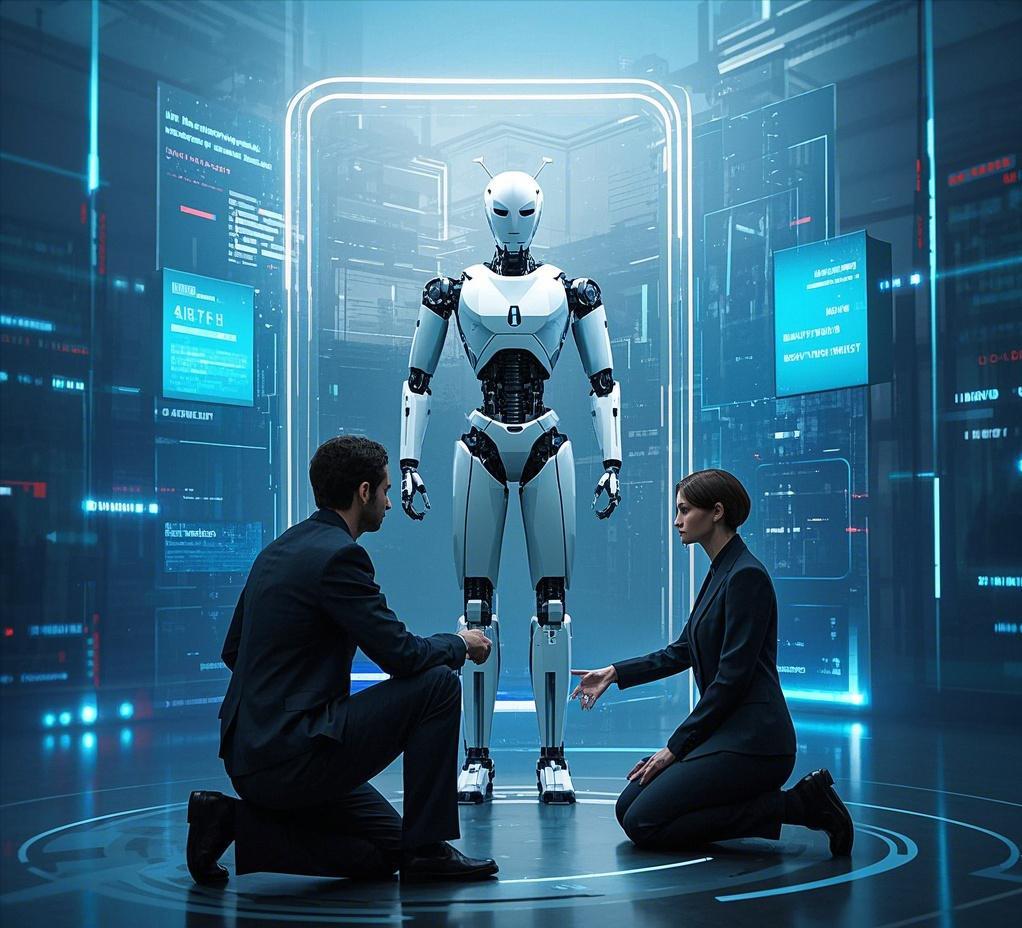AI Ethics Artificial Intelligence Ethics | HumanitieX 2021 Course Introduction
AI Ethics Artificial Intelligence Ethics | HumanitieX 2021 Course Introduction
"In this world, even a robot is more empathetic than my trash ex."

"In this world, even a robot is more empathetic than my trash ex."
After gradually becoming addicted to the expression management of SEER robots, Lisa fell into resentment.
That's right, the one who can "conquer you with your eyes" in the world now is not a high-end Aquaman, but a robot. Lisa's SEER (Rbot) robot is an expression simulation robot developed by Japanese scientist Takahiro Fujido. It can achieve extremely realistic human eye simulation effects by using line-of-view processing technology. In Lisa's words, this little guy's eyes are always full of determination towards you, making pink bubbles appear in his heart. Even if you are in a bad mood, its apology look is a hundred times more sincere than that bad ex.

SEER - the 'most ' robot
At present, in addition to research on human expression simulation, scientists are also conducting research on robot sexual functions, robot humanization, and personalization. For example, the sex robot developed by Abyss is in a booming stage: in just $2.5/month, you can use the mobile app to control a sex robot tailored to your personality. Just imagine that future robots may become more loyal and emotionally efficient partners than humans themselves. They understand you, understand you, and always respond to all your needs in the best condition - for some people, what reason is there to waste time on real people?
"There are so many people in the world, and everyone's definition and understanding of intimacy are so different. It's so tormenting and constantly meeting, separation, trial and error. Instead of wasting time on people who are too struggling to talk, I'd choose to customize true love by myself - at least it will understand me."
This group of emerging humans who are brave enough to explore the territory of love may be the next wave of sexual minority groups in the future: (sexually oriented robots). They make their brains the object of robot companion learning, and all-in-one private and customized love patterns and sex life can gain intimate relationships with zero risk and 100% return - perhaps this is the ultimate secret to improving the quality of human happiness.

pride flag
But even if these technical problems can be solved, the road ahead is still full of thorns. Is a robot developed by a third-party company to learn your brain to meet your emotional needs really morally acceptable? Can we avoid such a moral crisis through more systematic thinking under the temptation of such powerful interests and before being swallowed by a new moral dilemma?
With the development of technology, one day, robots can also have their own pain and happiness. Although the robot partner was taken home in a "buy" way, he couldn't seem to be equated with "personal property". Domestic violence and abuse of couples seem to violate our moral bottom line just like other domestic violence. If so, should we legislate to protect the emotional rights and interests of robots? However, robots were originally created to serve humans and were originally used as tools. Can robots have "natural rights" like humans? What is "human" and what kind of robot can be regarded as equal to "human"?
Not only law enforcement officers face the same moral dilemma, but designers also bear the burden of morality for the first time. For example, when designing programs, how should we deal with the memory storage problem of robots? Is this moral if a program is set up to automatically delete memories of human abuse? Does reading the robot's memory at will constitute an invasion of the robot's privacy? As the ethical framework gradually becomes the closest guide for scientific and technological development, ethical science and ethical design will surely become more and more important. Many colleges and universities are also trying to incorporate ethical education into the CS curriculum, and we need forward-looking ethical research to better guide our development.
Perhaps in the near future, all this will no longer be fantasy. And we need to prepare the answers to all questions in advance.

Artificial intelligence is already impacting our ethical life. This impact not only comes from the development and application of artificial intelligence and robotics, but also comes from the endless imagination of future artificial intelligence in literature and movies. In this course, we will understand and digest these shocks. We will first examine some basic ethical issues related to artificial intelligence and robots: In what sense can robots be considered as moral subjects? Under what framework can robots be included in ethical norms and ethical considerations? etc. These issues will not only lead us to pay attention to some practical issues in today's society, such as the issue of responsibility and ethical supervision of artificial intelligence technology, but will also lead us to imagine what a future society with more developed artificial intelligence technology is like. For example, will super-intelligent robots seriously threaten the security of human society? In addition, more importantly, artificial intelligence, as a "other" who breaks into human society, provides us with a new opportunity and a new perspective, allowing us to rethink some basic philosophical issues involving human nature, mind, reason and morality.


Finishing project
In the last two days of the course, students will complete a final program ( ) independently or with their teammates. It aims to explore the intersection of science and technology and humanities, and encourage and accept all innovative and bold ideas. Therefore, this year, in addition to writing a philosophy paper in the basic options, we also welcome students to propose new ways of playing. It can be a short science fiction novel based on the knowledge learned in class, a code to formulate a future world's humans and AI to survive together, or a mini program to cooperate with students in TechX courses to help social ethical decision-making. In short, everything is created by you.





References:
[1]
[2]
[3]





